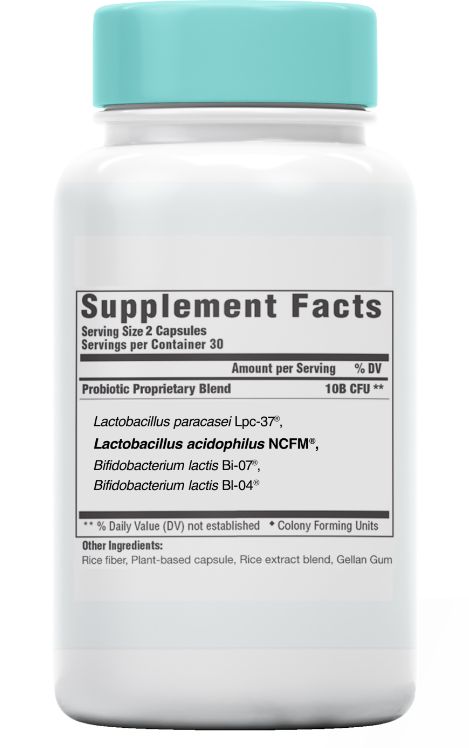It starts with the microbiome
The microbiome is made up of all the tiny living cells (bacteria, fungi, and viruses) that live in and around your body.
Within the microbiome, the majority of bacteria are beneficial—we call them “probiotics.”
While the complete list of the benefits of probiotic bacteria is ongoing, we know from research that these friendly bacteria aid in everything from digestion and immune function, to vaginal health and brain health.
The problem is when your microbiome becomes unbalanced.
Maybe you’ve been traveling, taking antibiotics, or just eating an unhealthy diet. These changes can throw off the balance of good and bad bacteria in your body—a condition known as dysbiosis. This can lead to gas, bloating, constipation, diarrhea, and even a weakened immune system.
How do you restore balance?
Taking a high-quality probiotic supplement can help replenish the beneficial bacteria in your gut. Keep reading to find out how to choose the best probiotic for your situation.
First, learn how probiotic names work
Each probiotic name is made up of three parts. Click through each part to find out what it can tell you.
The first part of a scientific name, the genus, tells us what category the animal or probiotic is in. A dog belongs to the genus “Canis.” Many probiotics, such as the one in our supplement label example, belong to the genus “Lactobacillus” (lak-toh-buh-sil-uhs).
The second part of the name tells us what species of animal or probiotic we’re talking about. In the dog example, the species “lupus” separates domestic dogs from other members of the Canis genus such as coyotes.
When it comes to probiotics, one species you’ll often find in supplements is “acidophilus” (a-suh-daa-fuh-luhs).


Next, find out why it matters
Different strains of probiotics have different benefits. Picking the correct product means getting to know the different strains of probiotics that are out there. Dogs and probiotics follow a similar taxonomy (genus, species, strain), and they each have a job to do.
YOU WOULDN’T CHOOSE A CHIHUAHUA TO RUN THE IDITAROD.
You would choose a breed better suited for the job and theenvironment. The same is true of probiotic strains. You cannot possiblyknow if the probiotic will get the job done without identifying the strain.
Now learn how to choose the probiotic that’s right for you.
Do you need to be more regular? Are you looking to boost your immune system? Probiotic strains support your health in many different ways. Research the strain that will deliver the health benefit you want, and then look for it in the ingredients listed on supplement packaging.
Look for Quantity and Quality
Check the SUPPLEMENT FACTS panel on the label for the probiotic dosage, which is most often measured in colony-forming units (CFUs). Some supplements will have more CFUs than others, which doesn’t necessarily mean it’s better. What really matters is if the product is using the same CFU amount that has been shown to bring about the intended health benefits. Also, make sure the product guarantees the potency until the time of expiration and not time of manufacture.


